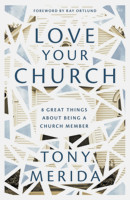
I recall an unforgettable occasion in my first pastorate in New Orleans. My text for the morning was James 2:1-13, about the sin of partiality (showing favoritism) and prejudice in the assembly. I asked the church, “How many of you want to grow numerically, as a church?” Hands went up. I then asked, “Wouldn’t it be great to see this building full of people, to see ministries expanding, and perhaps to be able to invest in multiple church plants around the world?” “Amens” were offered up. But then I asked, “What if 75% of this growth came from non-white people?”
This question created an awkward moment. A few people cheered, many squirmed, and others snarled. I remember one person walking out the door. Others seemed to be thinking, “I hope you have a plan after this introduction, pastor.”
The church was located in a diverse neighborhood, but the vast majority of the church members were white. My burden was not only to see us grow numerically but for us to see our church reflect our neighborhood.
So, I pressed further: “What if half of the pastoral team was black and/or brown? What if you were in the hospital, and a pastor of color visited you? How would you feel about that?” I finally asked, “As a church, do we really want to grow, or do we want more people that just look like us and share our interests, opinions, and class?”
"We have no right to be welcomed by Jesus into his family, but, by faith in him, we have been received by him... And now, as a church, we are to be a welcoming community of believers centered on the gospel."
I could have phrased the question differently and simply asked, Do we really want to be a truly welcoming church? I had no desire to hurt or be hurt, but I had every desire to reflect the New Testament vision of the church made up of diverse believers in the Lord Jesus.
Prejudice and discrimination are ongoing human problems and talking about them (especially with regard to the church) often makes us very uncomfortable. But God’s word addresses this issue in many ways and in many places, so God’s people need to think about it.
This occupies much of the background of Romans, as Paul is trying to unite Jew and Gentile Christians. After addressing this matter throughout Romans, Paul gets very practical in chapters 14 and 15, describing how the “weaker brother” (one with a sensitive conscience, predominantly Jewish) and the “stronger brother” (one with a stronger conscience, predominantly Gentile) are to relate to one another. He then says, “Therefore, welcome one another, as Christ has welcomed you, for the glory of God” (Romans 15:7). This is an important verse for every church member to keep in mind.
We have no right to be welcomed by Jesus into his family, but, by faith in him, we have been received by him. He received us graciously, gladly, and fully. And now, as a church, we are to be a welcoming community of believers centered on the gospel.

Be inspired to grow in your love for and commitment to your local church as you understand what it means to belong to God’s family.
The biblical narrative shows us both why alienation and division exist today and how Jesus came to remedy them. In creation, God made us in his image (Genesis 1 – 2). Every person of every race and background has equal value, dignity, and worth. But there has been a fall (Genesis 3). Sin has alienated us not just from God but from other people. Division and hostility now exist between races, classes, ages, and tribes. However, through Christ, we can be reconciled to God and to one another.
Such unity testifies to the power of the gospel. Jesus breaks down walls, and we are meant to see the evidence of that in the local church (Ephesians 2:11-22)! And one day in the new creation, all things will be made new, and we will experience glorious unity amid beautiful diversity as we exalt the Savior (Revelation 5:9-10).
So, our great need is to apply the gospel to this problem, to live with a kingdom worldview, to remember the grace God has shown us, and to remember where history is headed. Partiality, prejudice, and tribalism are dark places, but the good news of Jesus invades the darkness.
This is an extract from Love Your Church by Tony Merida. A free small group kit is available to help small groups read through the book together, discuss it, and apply the principles.